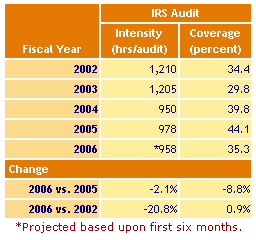IRS Goes Easier on Biggest Corporations
 When called on the facts that they're conducting fewer audits of large companies (assets over $250 million), and spending less time when they do, the IRS disagrees that it's giving the big boys a break.
When called on the facts that they're conducting fewer audits of large companies (assets over $250 million), and spending less time when they do, the IRS disagrees that it's giving the big boys a break.The facts, contained in a new TRAC report and covered in the NY Times and elsewhere, are that the IRS has reduced the time spent on each audit by 21 percent in the last five years, to 958 hours from 1,210 hours. At the same time, the number of actual audits, which had increased in the last two years, has fallen back to the level of 2002.
(Keep in mind that companies of this size, while filing only 0.2% of all corporate returns, control 90% of all corporate assets and receive 87% of all corporate income, according to data from an earlier TRAC report.)
The IRS responds that they're just leaner and meaner:
IRS spokesman Terry Lemons said the agency strongly disagreed with TRAC's conclusion that the biggest corporations were getting off easy. "Large corporations are not getting easier treatment," he said. "They are hearing more often from us and getting bigger tax bills."
He said that, between 2002 and 2006, the recommended levy per return for audits of corporations with assets of $250 million and up had gone from $3.65 million to just under $6 million.
Now, it's plausible that the IRS is enforcing the tax laws more effectively, and that's why they are able to increase the total tax collected from big companies with less auditing. (The IRS says that $48.7 billion in enforcement revenue was collected in fiscal 2006, up from $47.3 billion the previous year, a 3% increase.) But that's not the only possible explanation.
It might also be that more big companies are just plain cheating more. If they know it's less likely they'll be audited, and the audits that are conducted will be quicker and less thorough, then there's greater incentive to cheat. So perhaps there's a lot more tax cheating going on, and that 3% increase in tax revenues from these companies is just the easy-to-reach low-hanging fruit.
The big problem is that the IRS has stopped providing the information that would make it possible to know which of these scenarios is true.
Prof. Sue Long, a director of the Syracuse clearinghouse, said getting the data used in the research had been a problem. The I.R.S., Professor Long said, initially turned over a small number of pages of data in May after Judge Marsha Pechman of Federal District Court in Washington directed the I.R.S. to resume complying with a 1976 order to make the data available. Later, after she complained, the I.R.S. turned over much more data.
Professor Long said the data was a mess. "It took us months to sort it out," she said.
"They told us they had given us all of it, but we noticed from the page numbers in the upper right hand corner that they had not and it turned out they had given us less than 1 percent of the data" that the university researchers eventually received, Professor Long said.
In addition, she said, it is difficult to tell if the data is complete because the I.R.S. will not provide an inventory.
No administration enjoys having independent watchdogs look over their shoulder, but the level of secrecy and FOIA non-compliance by the Bush administration is unprecedented. The new Congress will likely be able to do little to improve the FOIA climate, that will have to wait until 2008. For now we see through a glass, darkly.


0 Comments:
Post a Comment
<< Home